If there’s anything I love as much as (if not more than) reading, it’s tracking and documenting my books. Which is why my annual reading recap is one of my favorite posts of the year! Throughout the year I log my reading in as many places as possible (Goodreads, StoryGraph, Evernote Document, Google Spreadsheet, Print Journal, Digital Journal, and Pinterest—not to mention here on the blog), and in this annual post I get to see the fruits of my labor as it all comes together. Today, I’m excited to share the nitty gritty of my reading life in 2023, along with my favorite books of the year.
(For those interested in seeing what my reading life looked like in previous years, plus a whole lot of backlist book recommendations, you can see each of my past recaps here: 2022, 2021, 2020, 2019, 2018, 2017, 2016, 2015, 2014, and 2013.)
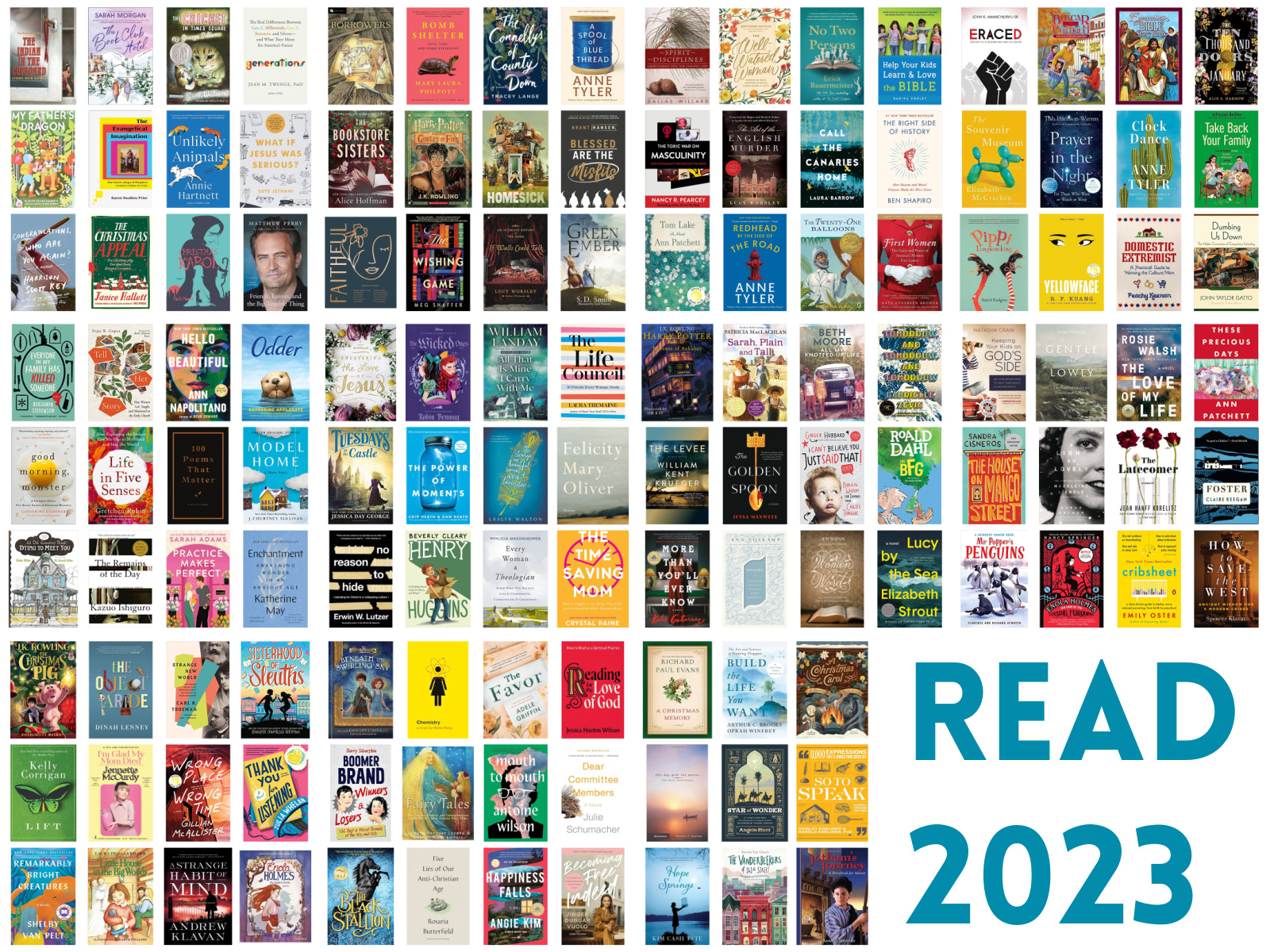
I read or listened to 130 books this year, following my trend of reading fewer books every year since my record high of 205 books in 2018. (For comparison’s sake, I read 145 books in 2022, 155 books in 2021, 168 books in 2020, 170 books in 2019, and 205 books in 2018.) There are many reasons for this decline, but the biggest culprit is that I’m busier these days and have less time for reading. Homeschooling in particular takes up a lot of our time, and though I read hundreds of picture books with the twins and plenty more textbooks with Charleston, I didn’t include those in our book count (though I did include our read-aloud chapter books: there were 23 of them this year!).
Another reason for the decreased book count is my growing preference for Kindle and Print books over Audiobooks: Audio once made up a vast majority of my reading, but this year less than a third of my reading was in audio format. My kids are a chatty lot and I have a hard time listening to anything with them present; if I do have my earbuds in, I’m usually choosing podcasts (which require much less of my attention than audiobooks). I’m happy with this shift, as I tend to remember and enjoy books less when I read with my ears rather than my eyes. But it does take me longer to read visually, so fewer Audiobooks means far fewer books altogether.
Going further down the format rabbit hole—I’ve been choosing Print over Kindle books more and more, often reading in both formats at once (reading the Print at home and relying on my Kindle when I’m out and about, or reading (in Dark Mode) in bed at night). For documentation purposes, I recorded the format I read most for each book.
I read slightly more Fiction than Nonfiction this year, striking a balance that feels just right for me. It’s noteworthy that a vast majority (80%) of my Audiobooks were Nonfiction, as Fiction is hard for me on Audio. If you’re curious which books were read in which formats, you can see them here.
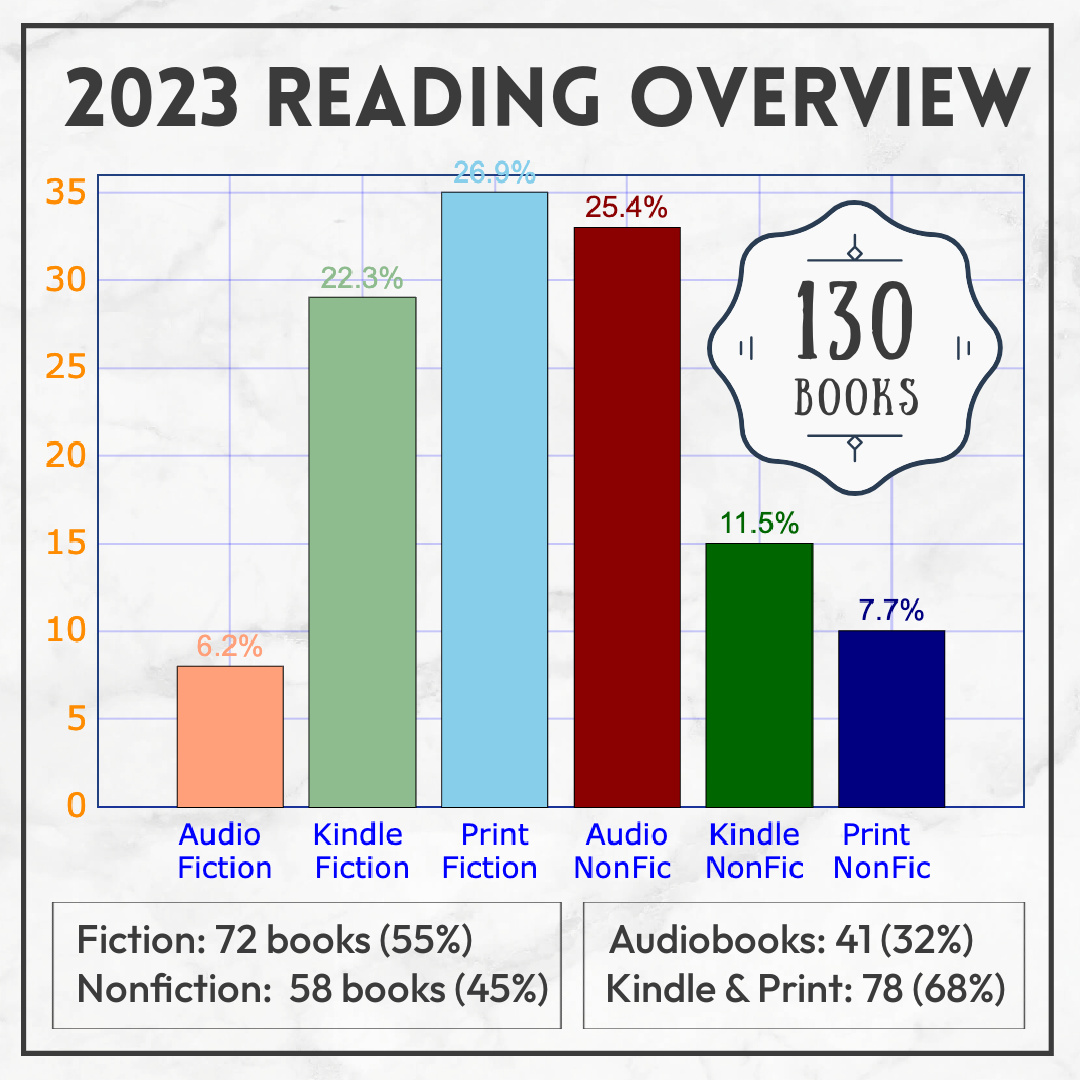
A few other nerdy details of my 2023 reading life:
- 36 of my books (28%) were published in 2023, and 95 (73%) were published since 2020.
- 29 books (22%) were Middle Grade or YA.
- More than 70% of this year’s books were written by female authors.
- January and April were my biggest reading months (14 books/month); my lowest reading month was May, when I finished just 6 books.
- 45 books (35%) I read this year came from my own bookshelves (Print or Kindle); the remainder were borrowed from the library (that includes digital borrows on Libby and Hoopla).
- My top book-recommenders were Anne Bogel (Modern Mrs. Darcy) and Sarah (Sarah’s Bookshelves Live).
Although my total book count was down this year, I was overall quite happy with the books I chose to read. Only 22 books were less than 4 Stars, with 27 5-Star books (and 14 more that were 4.5 or 4.75 Stars). I only DNF’d four books (abandoned after at least ten percent), though I sampled dozens more. I see this high success rate as an indicator that I’m getting better at choosing books I’ll enjoy, and quickly passing on books that I know won’t work for me. You can see my books organized by star rating on this Pinterest board.
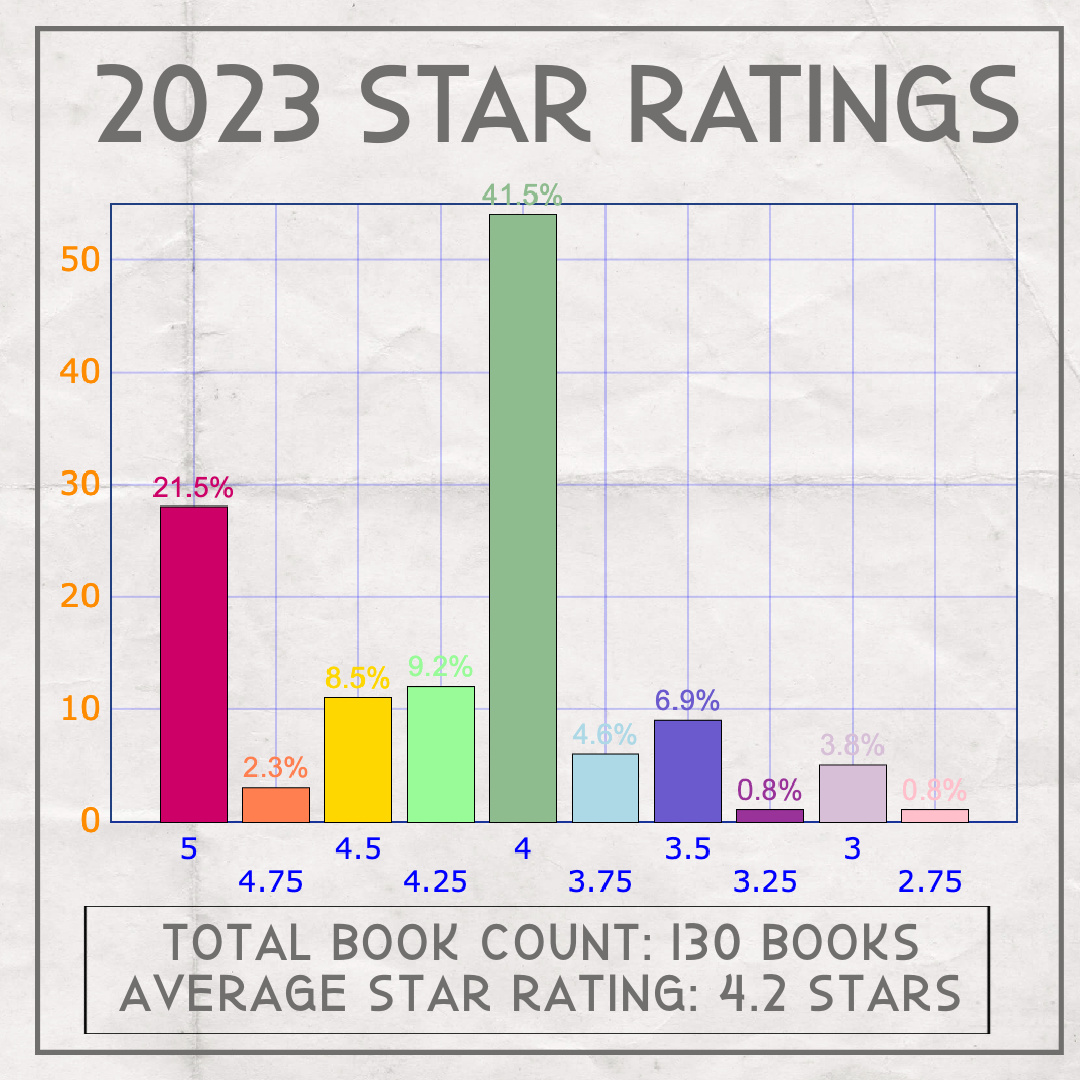
With so many stellar reads this year, I struggled to choose just twenty favorites. To narrow down my choices I kept my favorites to first-time reads (though many of my rereads were 5 stars). I also excluded devotional-type books and books written for a Middle Grade audience (though I couldn’t help but share some favorites from those genres in my Bonus Favorites). Every one of the favorites I’m sharing in this post received a 4.5 Star rating or higher, with most receiving a full 5 Stars.
Below you will see the titles of my twenty favorite reads of 2023, separated by Fiction and Nonfiction and listed alphabetically by the author’s last name. (There was no way I could order them by preference—choosing 20 favorites was hard enough without deciding which I liked most!) Along with each title and summary, I’ve shared a superlative I would offer that book, as well as link to the post where you can read a full book review. At the end of this post you’ll find some additional bookish superlatives (not all of them good ones).
I hope you enjoy reading about these stand-out reads of 2023; perhaps you’ll find some books to add to your 2024 TBR!
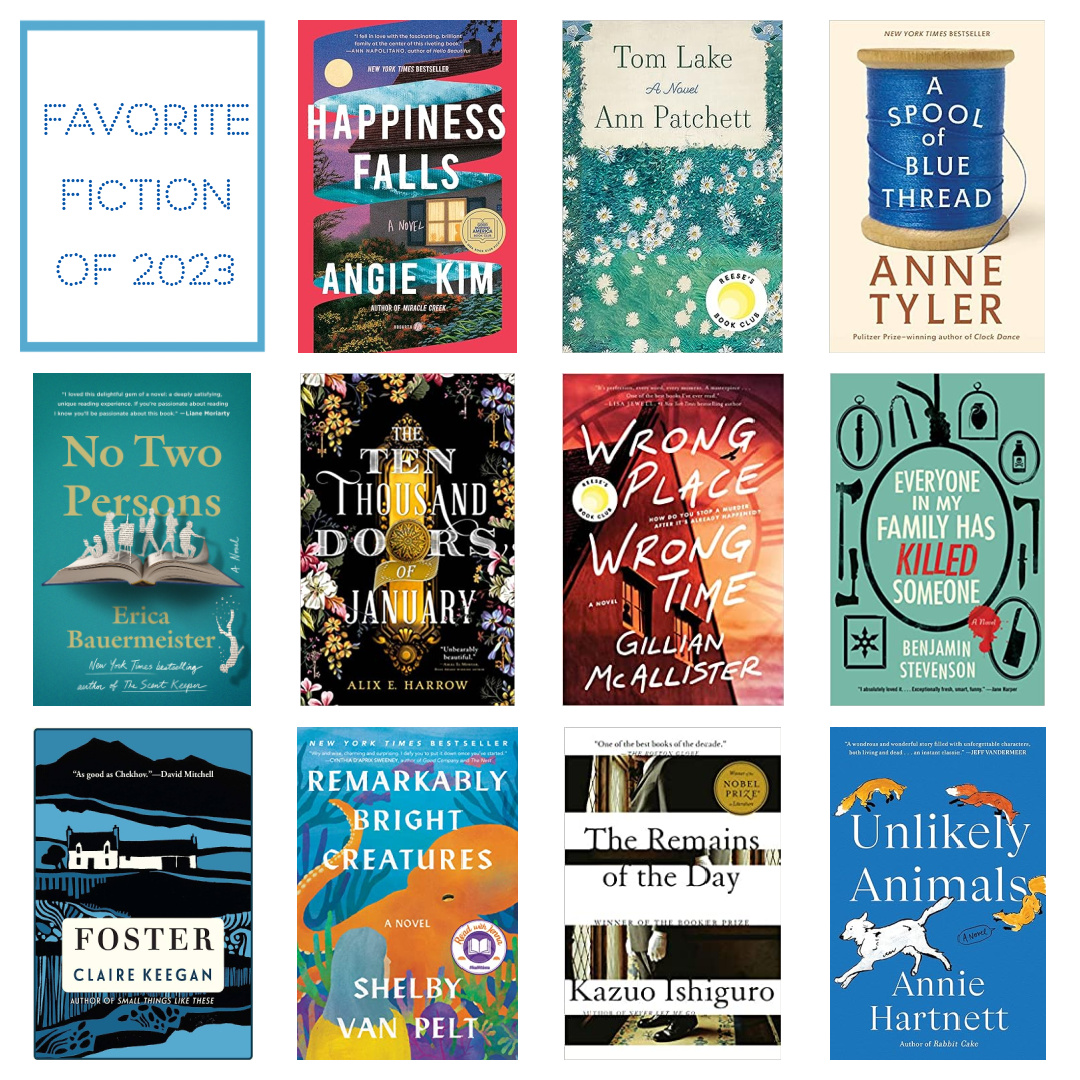
No Two Persons, by Erica Bauermeister: This powerful tribute to books is technically a short story compilation, with each story surrounding a single novel and its impact on ten different individuals—the author, the audiobook narrator, the literary agent, and others who cross paths with the book at pivotal moments. Each unique individual has an equally unique experience with the book, but each comes away changed as they gain new perspectives, come to see new ways forward, or simply feel seen and understood for the very first time. A character in the novel comments that books were like “a giant neighborhood where every family was different, and every door was open.” I savored every moment of seeing into the doors of this neighborhood, connecting with the experiences in each home, absorbing their histories and emotions and truth. SUPERLATIVE: #1 Favorite Book of 2023 (Original Review)
Foster, by Claire Keegan: On a hot summer day in rural Ireland, an impoverished Catholic farmer drives his young daughter (our unnamed narrator) to the coast where he leaves her with distant relatives. They will serve as her caretakers through the summer as a kindness to the girl’s parents, who are overwhelmed with too many children and not enough resources or self-restraint. The child immediately senses something different in this quiet, comfortable home. There is no harshness or cruelty here; in place of the neglect to which she is accustomed, she is met with tenderness and nurturing. Over the summer she blossoms, and she in turn brings healing and wholeness to a heartbroken couple who have so much love to offer. This story is one of loss and heartache, but it is the beauty and genuine goodness that I remember most. Foster is a compassionate and immersive novella that will break you apart, then mend your heart back together again. SUPERLATIVE: Best Story of Found Family, Best Novella (Original Review)
The Ten Thousand Doors of January, by Alix E. Harrow: This is the story of January Scaller, a young woman raised as the ward of a wealthy curator in his mansion of treasures at the turn of the twentieth century. When January stumbles upon a mysterious book filled with strange stories of other worlds, her own story—one marked by loneliness, curiosity, and a sense that she doesn’t belong—begins to make sense. Soon January’s prosaic life twists into something adventurous and frightening as she escapes her opulent prison in favor of something dangerous, beautiful, and free. Harrow’s writing is luxurious, an homage to the written word and language and the power of story. At the sentence level, it is poetic and lush; as a whole, the prose is one lovely thread in a sweeping, gorgeous tapestry of story. SUPERLATIVE: Most Magical (Original Review)
Unlikely Animals, by Annie Hartnett: The ghosts of Maple Street Cemetery (who collectively provide the unconventional narration for this book) are giddy to learn that Emma Starling is returning home to Everton, Connecticut. A natural-born healer, Emma’s onetime charm seems to have vanished; medical school no longer holds the appeal for Emma that it once did, so she is returning home (disgraced, or so she believes) to spend time with her father, Clive, who is dying of an unusual brain disease that causes him to hallucinate small animals and ghosts. Emma comes home to a family in disarray, as her mother is fed up with her husband’s erratic behavior, her brother Auggie is struggling to maintain his sobriety after a years-long drug addiction, and her father is pressing her to help with the investigation of Emma’s childhood best friend—yet another member of this won who appears to have succumbed to the throes of an opioid crisis. This one is very strange and really hard, but the tone is lighthearted and humorous, bordering on absurd in a way that totally worked for me. It was the quirky ghost story I didn’t know how much I wanted to read! SUPERLATIVE: Most Unusual Narration (Original Review)
The Remains of the Day, by Kazuo Ishiguro: Stevens is a butler who has committed his life to service at Darlington Hall. In the summer of 1956, Stevens embarks on a car ride through the English countryside and reflects back upon his many decades of loyalty to his profession and his employer. Over the course of a week, Stevens begins to question his previously held beliefs about dignity, duty, propriety, and purpose. Stevens makes peace with some of his choices while contemplating his regrets. This is a quiet novel, but a literary masterpiece that explores important and universal themes with subtly and nuance. It can be read at many levels, but I most appreciated Ishiguro’s poignant commentary on the converging of old and new ideas, the messy melding of classes and generations, the complications inherent in emotional and physical maturity, the shifting nature of memories, and the uncomfortable dynamic between hope and regret. SUPERLATIVE: Best Backlist (Original Review)
Happiness Falls, by Angie Kim: In June of 2020, twenty-year-old Mia—the brilliant, irreverent, and highly analytical narrator of our story—and her twin brother, John, are riding out the Covid pandemic in their Virginia home with their flawed but tight-knit biracial Korean American family. When their beloved father goes missing during an afternoon in a nearby park, Mia is certain there must be a plausible explanation; but what begins as an apparent misunderstanding quickly devolves into a harrowing investigation replete with family drama, frustrating Covid protocols, confusing timelines, and too many missing puzzle pieces. Most frustrating of all is that there IS someone who likely knows his father’s whereabouts, but 14-year-old Eugene has a rare combination of genetic disorders that prevent him from speaking or communicating what he knows. Though a mystery at its surface, Kim deftly incorporates elements of music theory, psychology (particularly the psychology of happiness), language studies, speech therapy, multiculturalism, and (my personal favorite) the special dynamic between boy/girl twins. The unique family situation and clever premise made this one of my most memorable reads of the year. SUPERLATIVE: Best Theme Potpourri (Original Review)
Wrong Place Wrong Time, by Gillian McAllister: Jen’s life as a hardworking lawyer, happily married to the love her life and mother to a brilliant teenage son, is fairly mundane. But her world is literally flipped on its side late one October night when she witnesses her son Todd commit a brutal murder. Todd is arrested and Jen goes to bed grief-stricken; when she wakes up it’s one day earlier, and each day after that, she awakens further into the past. Jen knows she’s been given a gift: the chance to undo her son’s crime, and also to reexperience the mothering moments she missed out on the first time. In reliving her life she gets a whole new understanding of her son and her marriage as everything she’d presumed true is called into question. This is an exquisitely-executed mashup some of my favorite reading themes and tropes: speculative fiction (in the form of time travel); British characters and setting; commentary on how life changes slowly without our notice (this thanks to the time traveling theme); a subtle romance and less subtle love story between a mother and her child (with gasp-worthy, heart-in-my-throat, stomach-plummeting reflections on parenthood); and a mystery/thriller that is propulsive but in no way gory, and just the right level of dark. So many readers have loved this, and I see why. SUPERLATIVE: Best Time Travel, Most Interesting Story Structure (Original Review)
Tom Lake, by Ann Patchett: In the spring of 2020, Lara’s three young-adult daughters have returned home to the family’s cherry orchard in Northern Michigan. During long days spent picking cherries, Lara recounts her love story with Peter Duke, a famous actor with whom she shared a stage three decades earlier—long before he became a household name. The backdrop for Lara and Peter’s summer affair was a Michigan theater company called Tom Lake, and Lara’s story transports her daughters to that simpler time that would go on to change the trajectory of her life. The weeks of storytelling and cherry-picking and quarantining mark a new era in this family as the girls come to see Lara in a new light, and Lara must reckon with past decisions and present realities. I would not have thought a COVID book could be a comfort read; Tom Lake proved me wrong. This was a mesmerizing novel that I never wanted to end. SUPERLATIVE: Most Comforting (Original Review)
Everyone in My Family Has Killed Someone, by Benjamin Stevenson: The Cunninghams have gathered at a mountain ski retreat for an unconventional (and not quite happy) family reunion. But as our narrator Ernest (an author who writes how-to manuals for mystery novelists) lets us know from the outset, everyone in this family has killed someone—even him. So when one an apparent murder takes place at the resort, then another and another, we shouldn’t be surprised. The only question: who among this family of killers is guilty of these crimes? Described as Knives Out meets And There Were None, this family drama/locked room mystery genre mashup knocked my expectations out of the park with its quirky narrator, humorous tone, and clever plot. SUPERLATIVE: Most Engaging Narrator (Original Review)
A Spool of Blue Thread, by Anne Tyler: Red and Abby Whitshank are given a shock when their young adult son calls home with surprising news. Denny has always been the black sheep of the family, never fitting in with his high-achieving siblings. Despite Denny’s wayward ways, the Whitshanks have been a family admired by outsiders (or at least that’s how they assume they are perceived!), but within the walls of their generational home, there has been resentment and secrets, jealousies and hidden agendas, extending back through three generations of Whitshanks. The story unwinds—not unlike the titular spool of thread—through the family history, back into Red and Abby’s courtship in the 1950s and to Red’s parents, who met under fraught circumstances in the 1920s and forged an unconventional path towards homeownership in their enviable Baltimore neighborhood. At the core of the family saga is the steadfast and much-admired family home, itself a character within the Whitshank legacy, and as we spiral back towards the home’s origin we begin to understand and sympathize with these three generations whose insecurities, hardships, and striving have woven them together while also forcing them apart. Anne Tyler was my most-read author this year, and she repeatedly astounded me with her understanding of humans, families, and how we “do” life; every one of her books is a winner, but this was my favorite of hers this year. SUPERLATIVE: Best Multigenerational Family Story (Original Review)
Remarkably Bright Creatures, by Shelby Van Pelt: Marcellus is a remarkably bright being with a keen understanding of human nature, a healthy perspective on the purpose and meaning of life, a mischievous sense of adventure, and a wry sense of humor. He also happens to be an octopus, serving out a life sentence at the Sowell Bay Aquarium on the Washington Coast. Marcellus tends to be a loner, but finds an unlikely friend in Tova, the seventy-year-old cleaning woman who took on the night shift at the aquarium after the recent death of her husband. For Tova, life as a widow has been especially hard, reopening the wounds that never fully healed after the mysterious death of her teenage son, Erik, over thirty years ago. The brilliant Marcellus has deduced what happened the night Tova’s son disappeared, and he has his three hearts set on helping her unearth the truth. This is a beautiful tale of friendship and found family, a thoughtful meditation on grief in its various forms, and most of all a story of unexpected kindness, second chances, and rediscovered hope. At times humorous and occasionally heartbreaking, Remarkably Bright Creatures is exceptionally endearing, and in Tova and Marcellus we are treated to delightful characters I continue to think about, almost a year after reading their story. SUPERLATIVE: Most Endearing Protagonists (Original Review)
BONUS PICKS—Favorite Middle Grade Books of the Year: The Sisterhood of Sleuths, by Jennifer Chambliss Bertman: (Original Review), Homesick, by Kate Klise (Original Review), and 43 Old Cemetery Road: Dying to Meet You, by Kate Klise: (Original Review)
BONUS PICK—Favorite Christmas Read: A Christmas Carol, by Charles Dickens
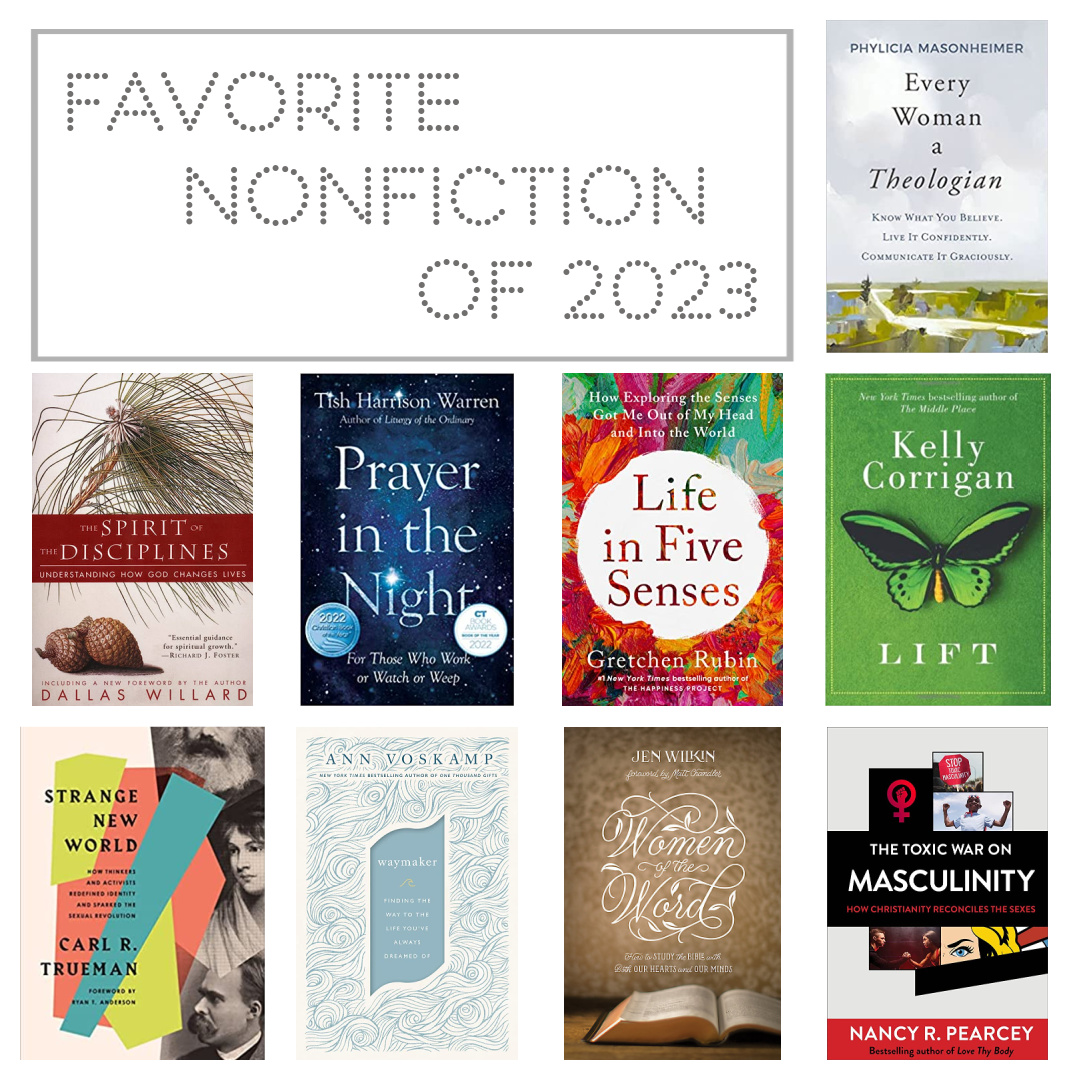
Lift, by Kelly Corrigan: In a gut-wrenching letter to her young daughters, memoirist Kelly Corrigan documents for her children the moments she’s certain they won’t remember. We get glimpses into their birth stories, and medical scares, and the instances that informed Corrigan’s motherhood even before the births of her children. There’s heartbreak and too many passages that will have every parent nodding in solidarity, thanks to Corrigan’s knack for sharing small snippets of life that somehow encapsulate the whole thing—vignettes that illuminate life’s panoramas. This is especially close to my heart, as I write love letters to my own children every month; Corrigan has written the letter I wish I had the talent to compose myself. SUPERLATIVE: Best Love Letter to a Child (Original Review)
Every Woman a Theologian: Know What You Believe. Live it Confidently. Communicate it Graciously, by Phylicia Masonheimer: Phylicia Masonheimer believes in the value of solid Biblical understanding and good theology (“the study of the nature of God and His truth”) for ALL Christians, not just those in Christian leadership. Our theology offers intellectual satisfaction, but it is so much more: it also provides direction and an understanding of our purpose and identity. Here, Phylicia shows us how faith and intellect go hand in hand, then walks us through the process of loving God with our minds as we come to a deeper understanding of various aspects of theological understanding. This one is thoroughly researched and thoughtfully articulated, packed with great insight, strong truth, and abundant grace. SUPERLATIVE: Best Book on Theology (Original Review)
The Toxic War on Masculinity: How Christianity Reconciles the Sexes, by Nancy Pearcey: In this essential work that blends history, sociology, psychology, and Biblical principals, theologian Nancy Pearcey disentangles the concepts of masculinity and toxicity, differentiating between the qualities of a “good man” and a “real man.” She takes us on a fascinating journey through the history of gender roles, stereotypes, and expectations in America, examining ways that the sacred and secular ideas around these topics have commingled. And using anecdotes, studies, and historical documents, Pearecy examines ways that the elevation and denigration of BOTH sexes at alternating times in history has led to our current unhealthy and unbiblical understanding of true masculinity and femininity. Most importantly, Pearcey dispels the myth that evangelical Christian men are quintessentially toxic, and she paves a way forward for healthy marriages, families, and cultural understanding of men and women, in and out of the church. Pearcey’s writing is pragmatic, honest, and compassionate, and it pairs well with the Carl R. Trueman’s works (see Strange New World below). SUPERLATIVE: Most Insightful (Original Review)
Life in Five Senses: How Exploring the Senses Got Me Out of My Head and Into the World, by Gretchen Rubin: In this book, happiness guru Gretchen Rubin takes us with her as she explores her senses, learning to appreciate them through various experiments and new practices. Through daily visits to the Metropolitan Museum, excursions to unique concerts and exhibits, classes (in things like perfumery), and challenges (in shopping, taste-testing, and more), Gretchen grows to better understand herself as she more fully appreciates each of her five senses. Though framed as memoir, Gretchen works science, trivia, psychology, and history into each chapter, giving us a comprehensive education on the how and why of the physical world. This book has seriously recharged my own appreciation of the physical world, heightening my awareness of my appreciated AND neglected senses. SUPERLATIVE: Most Discussable, Most Fun (Original Review)
Strange New World: How Thinkers and Activists Redefined Identity and Sparked the Sexual Revolution, by Carl R. Trueman: In his 2020 book The Rise and Triumph of the Modern Self, historian and theology professor Carl R. Trueman offered an expansive analysis of current cultural trends relating to sexual identity, cancel culture, and individual rights. That book was excellent and went a long way in helping me understand much of what we are witnessing in the US and across the world today, but at nearly 500 pages, and packed with references to historical documents and complicated philosophical ideologies, Rise and Triumph wasn’t exactly an accessible read. Here, Trueman has condensed the ideas into a much more manageable tome in which he explores the roots of our cultural obsession with individuality and selfhood. Drawing from the work of intellectuals, artists, poets, and politicians, along with an examination of how technological developments have led us to believe we are masters of our own destinies, Trueman shows how psychology came to be sexualized, and how sexuality in turn became politicized. He also traces the timeline of events and prevailing ideas that have led to increasing acceptance of gender nonconformity, a prioritization of felt authenticity over verifiable reality, and the bleeding together of old understandings with new priorities that has led to where we are today. While Trueman has no solutions to offer, this is an invaluable read for Christians struggling to understand and find a place in our strange new world. SUPERLATIVE: Most Important Social Commentary (Original Review)
WayMaker: Finding the Way to the Life You’ve Always Dreamed Of, by Ann Voskamp: In this powerful, genre-bending memoir, Ann Voskamp offers a roadmap for Christian sojourners as we make our way back to God and surrender to His guidance and provision. Through the most intimate stories—beginning with an unconsummated honeymoon and journeying through decades of steadfast but difficult marriage, a gut-wrenching adoption story, and Ann’s experience with heartbreak and literal heart failure—and with writing that is more poetry than prose, Ann walks the path along with her fellow wayfarers as we lean into the headwinds of our faith, trusting in the truths of Scripture and the sovereignty of our Savior. I was captivated by Ann’s incredible stories, inspired by her faithfulness, and fascinated by the parallels she draws between her own (vulnerably detailed) marriage and adoption experience and our walk with the Lord as we seek to implement the compass for a SACRED way of life. SUPERLATIVE: Most Vulnerable, Most Poetic (Original Review)
A Prayer in the Night: For Those Who Work or Watch or Weep, by Tish Harrison Warren: “Keep watch, dear Lord, with those who work, or watch, or weep this night, and give your angels charge over those who sleep. Tend the sick, Lord Christ; give rest to the weary, bless the dying, soothe the suffering, pity the afflicted, shield the joyous; and all for your love’s sake. Amen.” These are the words of Compline, from the Book of Common Prayer, and this simple but powerful prayer forms the framework for this book written by an Anglican priest. A Prayer in the Night examines the importance of work, the value of looking ahead towards Christ, and the lost art of healthy grieving, with further chapters unpacking a Biblical and historical understanding of weakness, embodiment, suffering, miracles, doubt/belief, and learning to acknowledge our facility while also pursuing joy even in the midst of suffering. This is a deeply human book, but one that points to the existence and sovereignty of our Creator. It feels counter to both church and secular culture in deeply healthy ways. I already have plans to reread this in the new year. SUPERLATIVE: Best Treatise on Prayer (Original Review)
Women of the Word: How to Study the Bible with Both Our Hearts and Our Minds, by Jen Wilkin: This is an invaluable resources for those of us wanting to make Bible study our own. Bible Teacher Jen Wilkin begins with an explanation of the ways many of us have gotten turned around in our approach to the Bible, and she reorients us and makes a strong case for the value of Biblical literacy. She then walks readers through the steps of sound Bible reading, offering an incredibly useful framework for systematic study. Though it has the word “women” in its title, this is beneficial for both women and men seeking guidance in learning to study, understand, and apply Scripture. Pairs well with Every Woman a Theologian! SUPERLATIVE: Best Guide to Biblical Literacy (Original Review)
The Spirit of the Disciplines: Understanding How God Changes Lives, by Dallas Willard: In this book published nearly forty years ago, Dallas Willard—one of the most influential theologians of his era—argues that, “We can increasingly resemble Christ in character and in power by following him in his overall style of life … This was the method of his earliest disciples, and it is as valid today as it was then.” Willard digs into the theology of spiritual formation, expounding upon the nature of life, sanctification, embodiment, and spiritual fulfillment. He examines the history of the disciplines and why they have largely fallen out of favor among contemporary Protestants. He then expounds on the life and words of Jesus to make a case for how and why we should still be practicing them today. Though a majority of the book is an unpacking of the why of spiritual disciplines, Willard does dedicate a chapter to the thorough explanation of what these disciplines are and how we can embrace them. I’ve read many other books that build upon the ideas here; I enjoyed reading much of the source material here. SUPERLATIVE: Best Book on Spiritual Formation
BONUS PICK—Favorite Devotional of the Year: Star of Wonder: An Advent Devotional to Illuminate the People, Places, and Purpose of the First Christmas, by Angela Hunt
BONUS PICK—Favorite Word-Related Book of the Year: Faithful (Original Review)
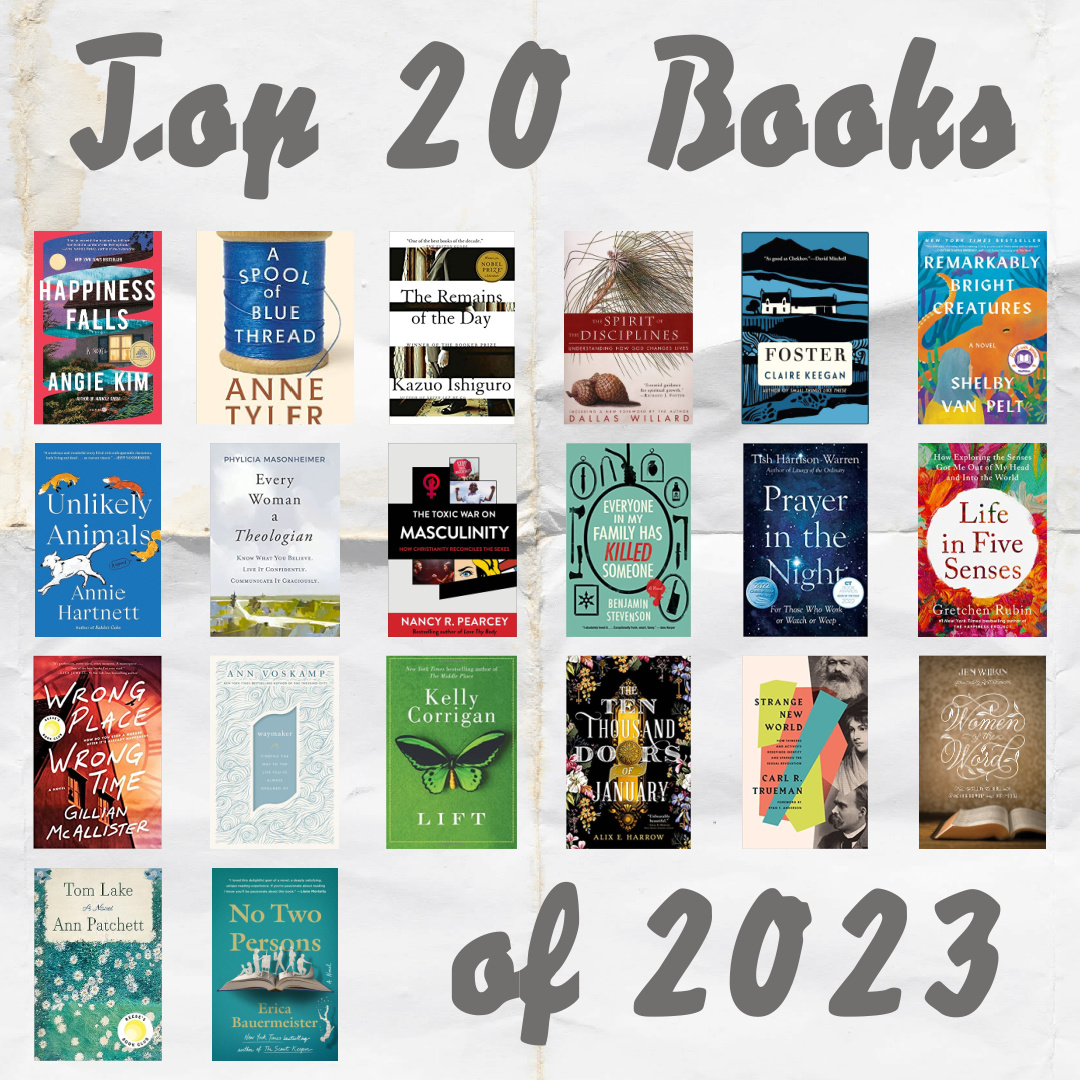
ADDITIONAL SUPERLATIVES (Note that many of these superlatives are NEGATIVE ones. Books marked with an asterisk received less than a 4-star rating from me.)
Most Complex Protagonist: More Than You’ll Ever Know, by Katie Gutierrez (Original Review)
Most Complicated/Least Likable Family: The Latecomer, by Jean Hanff Korelitz* (Original Review)
Most Uncomfortable/Complicated/Timely: Yellowface, by R.F. Kuang (Original Review)
Best Satire: Dear Committee Members, by Julie Schumacher (Original Review)
Best Audiobook: All My Knotted Up Life, by Beth Moore (Original Review)
Most Disappointing Sophomore Novel: The Connellys of County Down, by Tracey Lange* (Original Review)
Most Over-Hyped: Hello Beautiful, by Ann Napolitano* (Original Review) and The Wishing Game, by Meg Shaffer* (Original Review)
Least Favorite Read-Aloud: The Green Ember, by S.D. Smith* (Original Review)
Most Tragic: Good Morning, Monster: A Therapist Shares Five Heroic Stories of Emotional Recovery, by Catherine Gildiner (Original Review)
Best Essay Collection on Writing: These Precious Days, by Ann Patchett (Original Review)
Most Intriguing Cultural Commentary: Generations: The Real Differences Between Gen Z, Millennials, Gen X, Boomers, and Silents―and What They Mean for America’s Future, by Jean M. Twenge (Original Review)
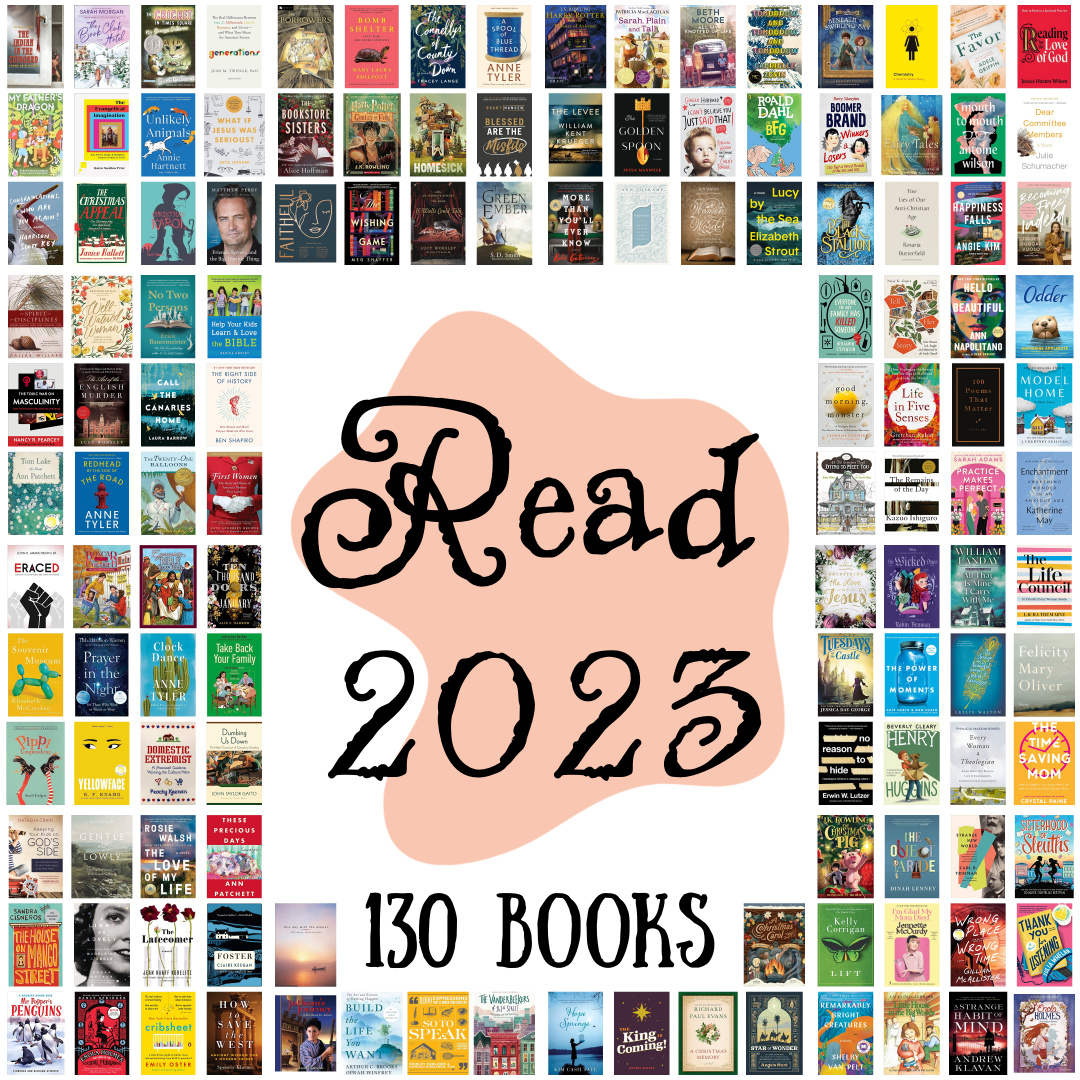
I’ll end this post as I always do, with an invitation for you to share YOUR reading stats and favorite books of 2023. What was the best thing you read ALL YEAR? I’d love to hear about it!
Wow, so many great books on this list. I enjoyed The Ten Thousand Doors of January, especially since it’s totally out of my wheel-house and stretched me a lot to read such a creative book. Women in the Word changed the way I study the Bible. I read it many years ago and I still refer to the different methods she discusses in the book. I am adding Foster and No Two Persons to my TBR.
Here are my top books of 2023, if interested: https://elle-alice.blogspot.com/2024/01/my-6-favorite-books-of-2023.html
I hope you enjoy No Two Persons; I don’t know a single reader who hasn’t loved it!